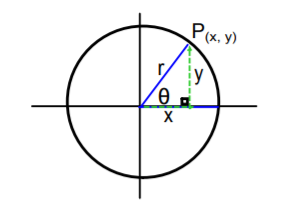Question
Question: The point(4,-4) is on the terminal side of an angle in standard position, how do you determine the e...
The point(4,-4) is on the terminal side of an angle in standard position, how do you determine the exact values of the six trigonometric functions of the angle?
Solution
In order to determine exact values of all six trigonometric function of the angle in the above question ,calculate r=x2+y2 where x will be 4 and y will be -4.And then find all the trigonometric ratios considering Hypotenuse as r ,opposite as -4 and adjacent as 4.
Formula used:
sinθ=HypotenuseOpposite cosθ=HypotenuseAdjacent tanθ=AdjacentOpposite cosecθ=OppositeHypotenuse secθ=AdjacentHypotenuse cotθ=OppositeAdjacentComplete step-by-step answer:
Given a point P(4,-4) which is on the terminal side of an angle in standard position.
Let x be 4 and y be -4

Calculating r using formula r=x2+y2
r=(4)2+(−4)2 r=16+16 r=32 r=42
Hence , value of r is 42
Therefore Calculating all the trigonometric ratios as
Note: 1. Periodic Function= A function f(x) is said to be a periodic function if there exists a real number T > 0 such that f(x+T)=f(x) for all x.
If T is the smallest positive real number such that f(x+T)=f(x) for all x, then T is called the fundamental period of f(x) .
Since sin(2nπ+θ)=sinθ for all values of θ and n∈N.
2. Even Function – A function f(x) is said to be an even function ,if f(−x)=f(x)for all x in its domain.
Odd Function – A function f(x) is said to be an even function ,if f(−x)=−f(x)for all x in its domain.
We know that sin(−θ)=−sinθ.cos(−θ)=cosθandtan(−θ)=−tanθ
Therefore,sinθ and tanθ and their reciprocals,cosecθ and cotθ are odd functions whereas cosθ and its reciprocal secθ are even functions.
3. Trigonometry is one of the significant branches throughout the entire existence of mathematics and this idea is given by a Greek mathematician Hipparchus.
4.One must be careful while taking values from the trigonometric table and cross-check at least once to avoid any error in the answer.
